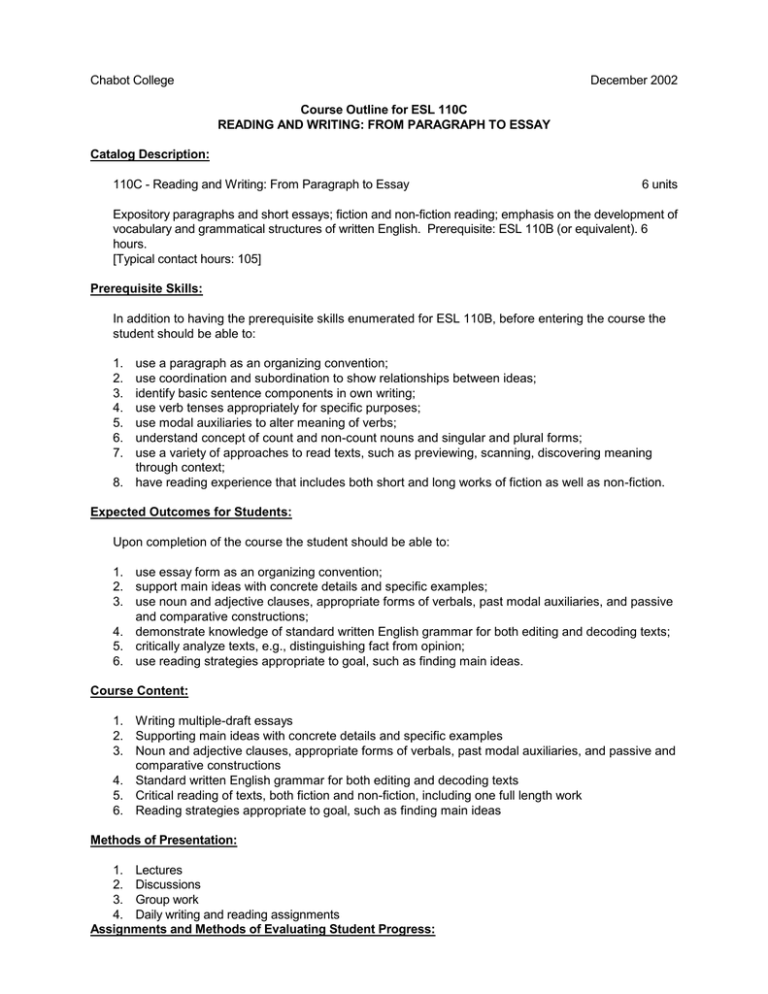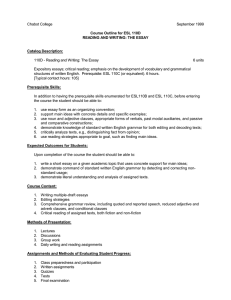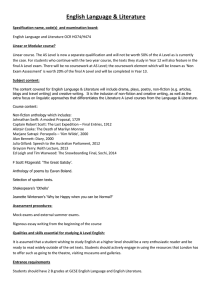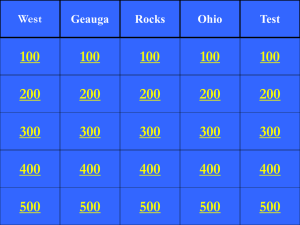Chabot College December 2002
advertisement

Chabot College December 2002 Course Outline for ESL 110C READING AND WRITING: FROM PARAGRAPH TO ESSAY Catalog Description: 110C - Reading and Writing: From Paragraph to Essay 6 units Expository paragraphs and short essays; fiction and non-fiction reading; emphasis on the development of vocabulary and grammatical structures of written English. Prerequisite: ESL 110B (or equivalent). 6 hours. [Typical contact hours: 105] Prerequisite Skills: In addition to having the prerequisite skills enumerated for ESL 110B, before entering the course the student should be able to: 1. 2. 3. 4. 5. 6. 7. use a paragraph as an organizing convention; use coordination and subordination to show relationships between ideas; identify basic sentence components in own writing; use verb tenses appropriately for specific purposes; use modal auxiliaries to alter meaning of verbs; understand concept of count and non-count nouns and singular and plural forms; use a variety of approaches to read texts, such as previewing, scanning, discovering meaning through context; 8. have reading experience that includes both short and long works of fiction as well as non-fiction. Expected Outcomes for Students: Upon completion of the course the student should be able to: 1. use essay form as an organizing convention; 2. support main ideas with concrete details and specific examples; 3. use noun and adjective clauses, appropriate forms of verbals, past modal auxiliaries, and passive and comparative constructions; 4. demonstrate knowledge of standard written English grammar for both editing and decoding texts; 5. critically analyze texts, e.g., distinguishing fact from opinion; 6. use reading strategies appropriate to goal, such as finding main ideas. Course Content: 1. Writing multiple-draft essays 2. Supporting main ideas with concrete details and specific examples 3. Noun and adjective clauses, appropriate forms of verbals, past modal auxiliaries, and passive and comparative constructions 4. Standard written English grammar for both editing and decoding texts 5. Critical reading of texts, both fiction and non-fiction, including one full length work 6. Reading strategies appropriate to goal, such as finding main ideas Methods of Presentation: 1. Lectures 2. Discussions 3. Group work 4. Daily writing and reading assignments Assignments and Methods of Evaluating Student Progress: Course Outline for ESL 110C Reading and Writing: From Paragraph to Essay December 2002 1. 2. 3. 4. 5. Class preparedness and participation Written assignments Quizzes Tests Final examinations Textbook(s) (Typical): Understanding and Using English Grammar, Betty Azar, Prentice Hall, third ed., 1999 More Reasons For Reading, Dobbs, Prentice Hall Special Student Materials: None dk 10/14/99 rev 12/10/02 D:\LAH\CURRICUL\FALL99\110C_REV.DOC Page 2






